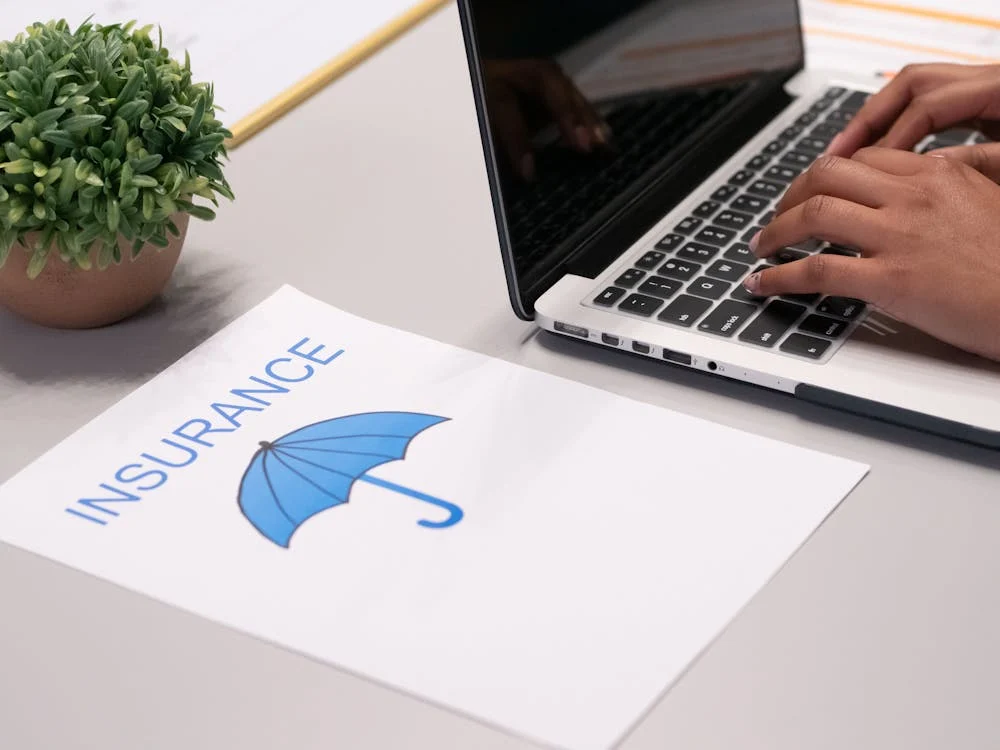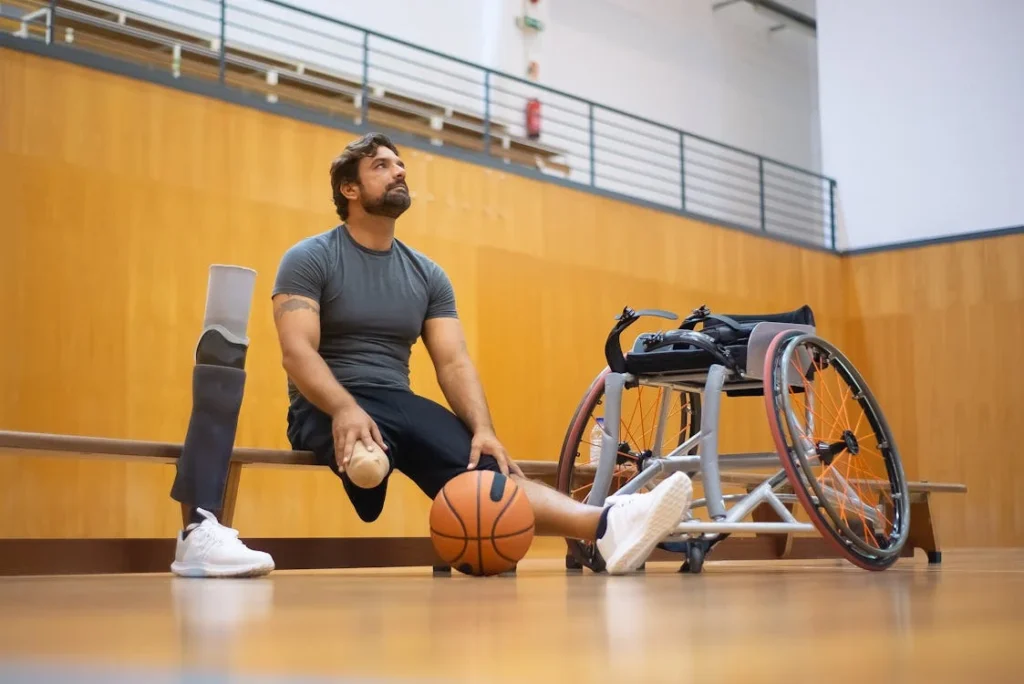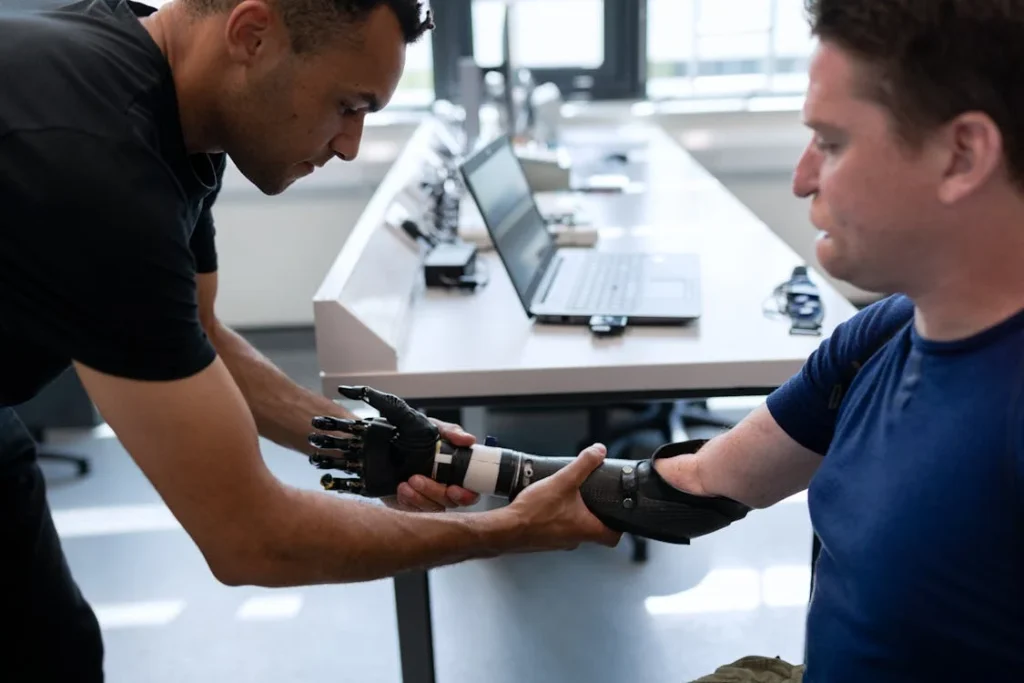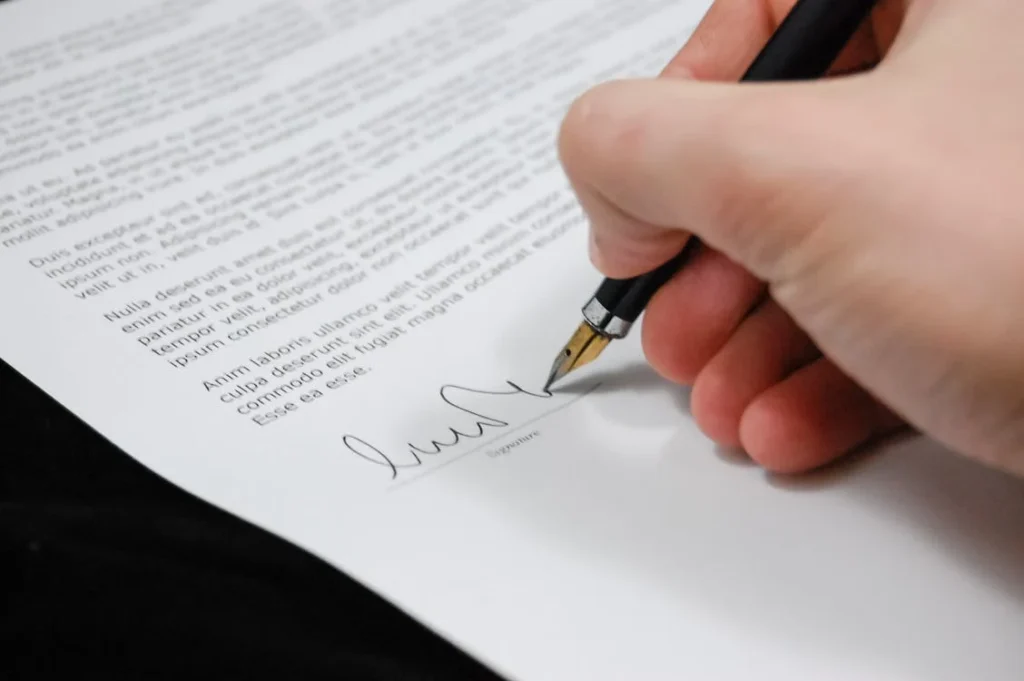Receiving a prosthetic limb can be life-changing, helping you regain independence and mobility. However, the process of getting insurance approval for prosthetic devices can sometimes be challenging. Many people are shocked when their insurance claim is rejected, leaving them unsure of what to do next. If this has happened to you, don’t lose hope. There are several ways to fight back, appeal the decision, and find alternative funding options.
Understanding why your claim was denied is the first step. Once you know the reason, you can take action to correct any mistakes, gather stronger evidence, and present your case in a way that increases your chances of approval. If your appeal still doesn’t work, there are other ways to get financial help for your prosthetic needs.

Understanding Why Your Insurance Claim Was Rejected
When your insurance claim for a prosthetic limb gets denied, the first step is to understand why. Insurance companies follow strict guidelines when approving medical claims, and even small errors can lead to rejection.
Knowing the exact reason for the denial will help you build a stronger case when appealing the decision.
Common Reasons for Claim Denial
One of the most common reasons for rejection is missing or incomplete documentation. Insurance providers require detailed medical records, prescriptions, and proof of medical necessity before they approve a prosthetic device.
If any of these documents are unclear, incomplete, or missing, your claim may be denied.
Another reason for rejection could be that your insurance policy does not cover prosthetic limbs. Some policies have exclusions for specific types of medical devices, while others may only cover basic models rather than advanced bionic limbs.
It is essential to review your insurance policy carefully to see what is included and what is not.
Insurance companies may also deny claims if they believe a prosthetic is not medically necessary. This can happen if your doctor’s prescription does not clearly explain why the device is needed for daily activities.
If the insurer sees the prosthetic as an “optional” device rather than an essential medical need, they may refuse to cover it.
Sometimes, claims are rejected due to administrative errors. This can include incorrect billing codes, mismatched patient details, or clerical mistakes made during the submission process. Even a minor error in paperwork can cause unnecessary delays or a complete denial.
What to Do After a Denial
After receiving a denial letter from your insurance company, do not panic. The first step is to carefully read the letter and identify the specific reason for the rejection.
Insurance companies are required to provide a reason for denial, and this information will help you decide on your next steps.
Once you understand why your claim was denied, contact your insurance provider to get more details. Ask if there is missing information or if there are specific documents that need to be resubmitted.
In many cases, insurance representatives can clarify what went wrong and guide you on how to correct the issue.
Next, reach out to your doctor or prosthetist. If the denial was due to insufficient medical evidence, your healthcare provider may need to submit additional documentation, such as a more detailed prescription, test results, or a letter explaining why the prosthetic is essential for your mobility and quality of life.
If the issue is related to policy coverage, request a copy of your insurance policy and go through the terms carefully. Some policies have clauses that allow for exceptions in specific medical cases.
If your policy does cover prosthetics but the claim was still denied, you may have grounds for an appeal.
At this stage, gathering all necessary documents is crucial. Having a complete file with medical records, a doctor’s statement, and supporting evidence will strengthen your case if you need to challenge the insurance company’s decision.

How to Appeal a Denied Insurance Claim for Prosthetics
If your insurance claim for a prosthetic limb has been denied, you have the right to appeal the decision. Many denials are overturned when additional evidence is provided or when errors in the initial claim are corrected.
The appeal process requires patience and persistence, but with the right approach, you can increase your chances of getting your claim approved.
Step 1: Review Your Denial Letter and Policy Details
Carefully read the denial letter from your insurance company. It will specify the reason for rejection and outline any steps you can take to appeal.
Understanding the insurer’s reasoning is essential before proceeding. If the letter is unclear, call the insurance company and ask for a detailed explanation.
Next, review your insurance policy to understand what is covered under prosthetic benefits. Some policies cover only basic prosthetic limbs, while others may include advanced bionic options.
If your policy mentions prosthetic coverage but your claim was denied, you may be able to challenge the decision based on the policy’s terms.
Step 2: Gather Strong Supporting Documents
To strengthen your appeal, you need solid evidence showing that your prosthetic limb is medically necessary. Work closely with your doctor, prosthetist, or physical therapist to obtain detailed documentation. A strong appeal file should include:
- A prescription from your doctor specifying the type of prosthetic needed
- Medical records that explain your condition and why a prosthetic limb is essential for mobility
- A letter from your doctor explaining how the prosthetic will improve your daily life and prevent further health complications
- Supporting evidence from your prosthetist detailing why a specific type of prosthetic limb is required
- Any past medical history or therapy records showing your progress and need for a prosthetic
If your claim was denied due to administrative errors, such as incorrect billing codes, ensure that the corrected paperwork is included in your appeal submission.
Step 3: Write a Strong Appeal Letter
A well-written appeal letter is crucial to making your case. It should be clear, professional, and to the point. Start by stating your name, policy number, and the reason for your appeal.
Explain why the prosthetic limb is medically necessary and how it will significantly improve your quality of life.
Make sure to reference your supporting documents and attach all relevant medical records. If your doctor or prosthetist has provided a letter on your behalf, mention it in your appeal and highlight its importance.
Address any concerns raised in the denial letter and explain why you believe the decision should be reconsidered.
Step 4: Submit Your Appeal and Follow Up
Once your appeal is complete, submit it to your insurance provider through the correct channels. Some companies allow online submissions, while others require a physical copy to be mailed. Make sure to keep copies of all documents for your records.
After submission, follow up with your insurance provider regularly. Processing an appeal can take weeks, so checking in ensures that your case is being reviewed. If additional documents are requested, provide them as soon as possible to avoid delays.
Step 5: Seek External Help If Needed
If your appeal is denied again, you still have options. Some insurance policies allow for multiple levels of appeal, so review your plan to see if you can submit another request with additional evidence.
You can also contact a patient advocacy group or a legal expert specializing in medical insurance claims. Organizations that assist people with disabilities often have experience dealing with insurance companies and may be able to provide guidance on your next steps.

What to Do If Your Appeal Is Denied
If your appeal is denied, it’s important not to lose hope. There are still options available to fight for your right to a prosthetic limb. Some individuals have successfully obtained coverage after multiple appeals, while others have found alternative funding sources.
The key is to stay persistent and explore every possible avenue.
Request a Second-Level Appeal
Many insurance companies allow for multiple levels of appeal. If your first appeal is rejected, check your policy to see if you can escalate the case further.
A second-level appeal typically involves a more thorough review, sometimes by an independent medical board. This is your opportunity to present additional evidence and clarify any misunderstandings that may have occurred in your previous submission.
At this stage, it may help to have a professional advocate, such as a lawyer who specializes in medical insurance disputes or a representative from a disability rights organization. They can help you frame your appeal in a way that increases your chances of approval.
File a Complaint with the Insurance Regulatory Authority
If you believe that your insurance provider is unfairly denying your claim despite having valid coverage, you can file a complaint with India’s Insurance Regulatory and Development Authority (IRDAI).
The IRDAI oversees insurance companies and ensures that they follow fair practices. Complaints can be submitted online through their Grievance Redressal Cell, and in many cases, an official complaint can put pressure on the insurer to reconsider your claim.
Before filing a complaint, make sure you have a complete record of your correspondence with the insurance company, including rejection letters, appeal submissions, and any medical documentation you provided. The more evidence you present, the stronger your case will be.
Check for State or Government Assistance Programs
In India, various government programs provide financial aid for prosthetic limbs, especially for individuals from low-income backgrounds. If your insurance claim is continuously denied, you may qualify for assistance under schemes like:
- The Assistance to Disabled Persons for Purchase/Fitting of Aids and Appliances (ADIP) Scheme, which provides financial support for prosthetic devices
- The Chief Minister’s Relief Fund or other state-level healthcare assistance programs
- NGO-supported initiatives that collaborate with the government to provide free or subsidized prosthetic limbs
Visit the nearest government hospital or disability support organization to check if you qualify for these programs.
Reach Out to Non-Profit Organizations
Several non-profit organizations in India specialize in providing prosthetic limbs to those in need. If insurance coverage is not an option, these organizations can help you get a high-quality prosthetic at little to no cost.
Organizations like Jaipur Foot (BMVSS), Narayan Seva Sansthan, and Ratna Nidhi Charitable Trust offer free prosthetic limbs to thousands of people every year.
Many of these groups also provide rehabilitation services, ensuring that recipients can fully adapt to their new prosthetic limbs.
Other NGOs collaborate with hospitals and prosthetic manufacturers like Robobionics, ensuring that people receive advanced, ergonomic, and lightweight prosthetic solutions.
These programs may require documentation of financial need, so it’s helpful to prepare medical and income-related records before applying.
Crowdfunding and Community Support
If other options fail, crowdfunding can be an effective way to raise funds for your prosthetic limb. Many individuals have successfully gathered financial support through platforms like Ketto, Milaap, and ImpactGuru, which allow people to donate toward medical expenses.
Social media can also be a powerful tool. Sharing your story with your community, friends, and family may encourage donations and support from unexpected sources.
Many local businesses, religious organizations, and charity groups are willing to help those in need, especially when they understand the life-changing impact of a prosthetic limb.

How to Prevent Insurance Denials in the Future
If your insurance claim has been denied once, it’s understandable to feel frustrated. However, learning from the experience can help you prevent similar issues in the future.
By taking proactive steps, you can improve the chances of your next claim being approved without delays or complications.
Choose the Right Insurance Plan
Not all insurance policies provide full coverage for prosthetic limbs. When selecting a health insurance plan, carefully review the details regarding prosthetic and durable medical equipment coverage.
Some plans may cover only a basic prosthetic, while others may include advanced myoelectric or bionic limbs.
If you are considering switching policies or upgrading your coverage, speak with an insurance advisor who specializes in disability-related claims. Understanding the fine print of your policy can help you make better decisions and avoid unexpected claim denials in the future.
Work Closely with Your Doctor and Prosthetist
One of the biggest reasons claims are denied is due to missing or incomplete medical documentation. To avoid this, work closely with your doctor and prosthetist to ensure that all required documents are submitted correctly.
Your doctor should provide a detailed prescription that clearly states why the prosthetic limb is medically necessary and how it will improve your mobility and quality of life.
Additionally, ask your prosthetist to provide technical specifications and justification for the device you need. If an advanced prosthetic is required for your specific condition, the documentation should explain why a basic model would not be suitable.
Stay Organized with Medical Records and Paperwork
Keeping a detailed record of your medical history, prescriptions, and past claims can make future insurance processes smoother. If your claim is denied, having all relevant documents readily available can help you respond quickly with an appeal or corrections.
Whenever you receive medical treatment related to your prosthetic needs, save copies of doctor’s notes, test results, therapy records, and past insurance approvals. This documentation will serve as valuable proof when submitting future claims.
Submit Claims Accurately and on Time
Many insurance denials occur due to administrative errors, such as incorrect billing codes, missing signatures, or late submissions. Double-check all paperwork before submitting a claim, and ensure that it is sent through the correct channels.
If your insurance provider has an online portal, use it to track the status of your claim in real time.
If you are unsure about any part of the process, contact the insurance company directly or seek help from a patient advocacy group. Being thorough from the start can prevent unnecessary delays or denials.
Consider Secondary Coverage or Supplemental Insurance
If your primary insurance policy has limited prosthetic coverage, you may want to explore secondary insurance options or supplemental disability coverage.
Some organizations offer assistance programs specifically for people with disabilities, helping to cover the costs that insurance may not.
For example, employer-based insurance plans sometimes include additional benefits for prosthetic users. If you are employed, check with your HR department to see if there are any company-sponsored insurance add-ons that could provide better coverage for prosthetic devices.
Advocate for Better Insurance Policies
Insurance policies and regulations are constantly evolving, and many disability rights organizations work to improve coverage for prosthetic users.
Getting involved in advocacy efforts, signing petitions, or sharing your experience with policymakers can help push for better insurance policies that benefit a larger number of people.
The more awareness that is created around the need for accessible prosthetic care, the greater the chances of insurance companies expanding their coverage options.
By staying informed and engaged, you can contribute to meaningful change for yourself and others in similar situations.

Understanding Your Rights as a Prosthetic User
Many people facing insurance denials for prosthetics are unaware of their rights. Knowing what protections exist can give you more confidence when appealing a decision or seeking alternative solutions.
In India, as well as globally, several laws and policies ensure that people with disabilities, including prosthetic users, receive fair treatment when it comes to medical coverage and accessibility.
Disability Rights and Insurance Coverage
Under the Rights of Persons with Disabilities Act, 2016 (RPWD Act) in India, individuals with disabilities are entitled to various benefits, including better access to healthcare.
This means that insurance providers cannot unfairly discriminate against prosthetic users by denying necessary medical equipment. If your insurance claim has been denied despite clear medical necessity, you may have legal grounds to challenge the decision.
Additionally, many government-backed health insurance schemes, such as Ayushman Bharat Pradhan Mantri Jan Arogya Yojana (PM-JAY), cover prosthetic devices for eligible individuals.
If your private insurer refuses coverage, exploring government insurance options may provide an alternative solution.
Filing a Legal Challenge Against an Insurance Denial
If your insurance provider continues to reject valid claims, you have the right to escalate the issue legally. First, file a formal grievance with the Insurance Ombudsman in your region.
This is a government-appointed body that helps resolve disputes between policyholders and insurance companies. If the issue remains unresolved, you can take legal action through consumer courts, which handle cases of unfair insurance practices.
Before pursuing legal action, consult with a disability rights advocate or a lawyer specializing in medical insurance claims. They can help you understand whether your case has a strong legal standing and guide you through the process.

The Emotional and Psychological Impact of Insurance Denials
Dealing with an insurance rejection can be emotionally draining. For many individuals who have lost a limb, getting a prosthetic is not just about mobility—it’s about restoring confidence, independence, and self-worth.
A denied claim can feel like a major setback, leading to frustration, stress, and even depression.
Coping with Stress and Anxiety
When faced with a rejection, it’s important to remember that you are not alone. Many people go through similar struggles, and support systems are available to help you navigate this difficult time.
Seeking guidance from support groups, online forums, and patient advocacy organizations can provide emotional reassurance and practical advice.
Practicing stress management techniques such as meditation, deep breathing exercises, and physical activity can also help you stay positive during the appeals process.
If you find yourself overwhelmed, consider speaking to a mental health professional who understands the challenges faced by prosthetic users.
Finding Motivation to Keep Fighting
It’s easy to feel discouraged after a denial, but persistence is key. Many insurance rejections are simply due to incomplete paperwork, misunderstandings, or administrative errors—all of which can be corrected.
Keep reminding yourself why this prosthetic is important to you. Whether it’s returning to work, playing with your children, or simply walking independently, your goal is worth the effort.
Success stories of people who have won their appeals or found alternative funding can serve as motivation. Connecting with others who have successfully navigated the system can give you the confidence to keep pushing forward.

Exploring the Future of Prosthetic Insurance Coverage
As medical technology advances, the demand for better insurance coverage for prosthetic limbs is growing. In the future, several factors may contribute to improved insurance policies and accessibility for prosthetic users.
The Role of Technology in Making Prosthetics More Affordable
3D printing and AI-driven prosthetic designs are reducing the overall cost of manufacturing prosthetic limbs. As prices become more affordable, insurance providers may be more willing to cover these devices.
Additionally, prosthetic subscription models—where users pay a small monthly fee instead of a lump sum—are being explored as an alternative way to make prosthetics accessible without full insurance coverage.
Robobionics is at the forefront of this innovation, developing high-quality, cost-effective prosthetics that are both advanced and accessible.
By combining ergonomic design with gamified rehabilitation programs, we ensure that users can adapt to their prosthetic limbs quickly and comfortably.
Policy Changes and Global Advocacy
With increasing awareness about disability rights, governments worldwide are making changes to improve prosthetic insurance policies. In many countries, advocacy groups are pushing for mandatory prosthetic coverage under all insurance plans.
India is also seeing progress, with more discussions on including bionic prosthetics and advanced mobility aids in health insurance policies.
If more individuals advocate for policy reforms and demand better insurance coverage, insurance companies will have no choice but to improve their offerings. Staying informed and involved in these discussions can help push the industry toward a more inclusive future.
Final Thoughts
Having your insurance claim for a prosthetic limb denied can be discouraging, but it is not the end of the road. With persistence, the right approach, and strong supporting documentation, many claims can be successfully appealed. If insurance remains a challenge, alternative funding sources like government programs, NGOs, and crowdfunding can help bridge the gap.
Robobionics is committed to ensuring that high-quality prosthetic solutions are accessible to everyone. If you are struggling with insurance coverage, reach out to our team for guidance. We can help you navigate your options and find the best path forward.
A prosthetic limb is more than just a medical device—it’s a tool for independence, mobility, and a better quality of life. Keep pushing forward, explore every available option, and take the next step toward regaining your freedom.



